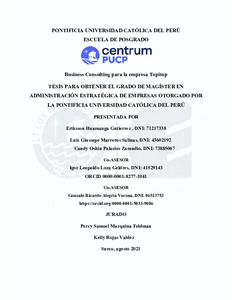| dc.contributor.advisor | Loza Geldres, Igor Leopoldo | |
| dc.contributor.advisor | Alegría Varona, Gonzalo Ricardo | |
| dc.contributor.author | Huamanga Gutierrez, Eriksson | |
| dc.contributor.author | Marreros Salinas, Luis Giussepe | |
| dc.contributor.author | Palacios Zamudio, Candy Oshin | |
| dc.date.accessioned | 2021-11-25T21:45:58Z | |
| dc.date.available | 2021-11-25T21:45:58Z | |
| dc.date.created | 2021 | |
| dc.date.issued | 2021-11-25 | |
| dc.identifier.uri | http://hdl.handle.net/20.500.12404/20978 | |
| dc.description.abstract | La industria textil es una de las que más contamina a nivel mundial y las recientes
tendencias de consumo de los últimos años hicieron que ese impacto negativo se vuelva
insostenible. Obligó a muchas empresas, en su mayoría grandes, a implementar iniciativas para
reducir los impactos negativos. Actualmente un gran nicho de consumidores en crecimiento
busca productos que sean amigables con el medio ambiente y con la sociedad.
En este contexto, la industria textil peruana tiene como competencia más fuerte a la
industria textil china, ya que esta tiene una fuerte posición en el mercado mundial desde hace
varios años gracias a sus precios bajos, sin embargo, no asume la responsabilidad sobre la gran
contaminación que genera y que es tan cuestionada.
El Grupo empresarial Topitop es un conglomerado textil peruano que está integrado en
gran parte de la cadena de producción textil hasta la venta de prendas de vestir. Actualmente
cuenta con 70 tiendas a nivel nacional y canal de ventas por internet. Es una de las empresas
peruanas que ocupa los primeros lugares dentro del ranking exportador. Después de décadas
positivas en ventas vienen sobrellevando la crisis económica causada por la pandemia del
COVID- 19 en la que tuvo una dramática reducción de sus ventas. Además, tuvo que reducir
puntos de venta, poniendo a la venta una planta de producción, reduciendo sus márgenes de
ganancias mediante downsizing.
Es por ello que el objetivo del presente trabajo es recuperar la competitividad de Topitop
en el contexto actual, donde los hábitos de consumo están en constante cambio y evolución. Se
propone dos alternativas de solución para los problemas identificados en el proceso de
consultoría. La primera es una estrategia de diferenciación que consiste en la confección de
prendas de vestir, hecha con materiales de alta calidad, customizada a las medidas del usuario y
de un largo tiempo de duración puestas a la venta mediante una plataforma virtual e interactiva
donde el usuario podrá diseñar su propia prenda. La segunda es una estrategia de expansión de
mercado, consiste en otra línea de prendas de vestir de modelos modernos y estandarizados
hechas de 100% algodón ecológico de la más alta calidad, que no genere impactos negativos en
el medio ambiente y bajo condiciones laborales justas. | es_ES |
| dc.description.abstract | The textile industry is one of the most polluting in the world and recent consumer trends
in recent years have made this negative impact unsustainable. It forced many companies, mostly
large, to implement initiatives to reduce negative impacts. Currently a large growing consumer
market is looking for products that are friendly to the environment and to society.
In this context, the Peruvian textile industry has stronger competition from the Chinese
textile industry, that have a strong position in the world market for several years thanks to its low
prices. However, it does not assume responsibility for the large pollution that it generates and
that is so questioned.
The Topitop business group is a Peruvian textile conglomerate that is integrated in a large
part of the textile production chain up to the sale of clothing. It currently has 70 stores
nationwide and an online sales channel. It is one of the Peruvian companies that occupies the
first places in the export ranking. After decades of positive sales, they have been weathering the
economic crisis caused by the COVID-19 pandemic in which they had a dramatic reduction in
sales. In addition, it had to reduce points of sale, putting a production plant up for sale, reducing
its profit margins through downsizing.
That is why the objective of this work is to recover Topitop's competitiveness in the
current context, where consumption habits are constantly changing and evolving. Two
alternative solutions are proposed for the problems identified in the consulting process. The first
is a differentiation strategy that consists of the manufacture of clothes, made with high quality
materials, customized to the user's measurements and of a long duration, put on sale through a
virtual and interactive platform where the user you can design your own clothes. The second is a
market expansion strategy, it consists of another line of clothes of modern and standardized
models made of 100% ecological cotton of the highest quality, which does not generate negative
impacts on the environment and under fair working conditions. | es_ES |
| dc.language.iso | spa | es_ES |
| dc.publisher | Pontificia Universidad Católica del Perú | es_ES |
| dc.rights | info:eu-repo/semantics/closedAccess | es_ES |
| dc.subject | Consultores de empresas | es_ES |
| dc.subject | Industria textil--Perú | es_ES |
| dc.title | Business Consulting para la empresa Topitop | es_ES |
| dc.type | info:eu-repo/semantics/masterThesis | es_ES |
| thesis.degree.name | Maestro en Administración Estratégica de Empresas | es_ES |
| thesis.degree.level | Maestría | es_ES |
| thesis.degree.grantor | Pontificia Universidad Católica del Perú. CENTRUM | es_ES |
| thesis.degree.discipline | Administración Estratégica de Empresas | es_ES |
| renati.advisor.dni | 41529143 | |
| renati.advisor.dni | 06513752 | |
| renati.advisor.orcid | https://orcid.org/0000-0001-8277-1041 | es_ES |
| renati.advisor.orcid | https://orcid.org/0000-0001-5033-9086 | es_ES |
| renati.author.dni | 71217338 | |
| renati.author.dni | 43602192 | |
| renati.author.dni | 73885067 | |
| renati.discipline | 413307 | es_ES |
| renati.juror | Marquina Feldman, Percy Samoel | |
| renati.juror | Rojas Valdez, Kelly | |
| renati.level | https://purl.org/pe-repo/renati/level#maestro | es_ES |
| renati.type | https://purl.org/pe-repo/renati/type#tesis | es_ES |
| dc.publisher.country | PE | es_ES |
| dc.subject.ocde | https://purl.org/pe-repo/ocde/ford#5.02.04 | es_ES |





